"The law of unintended consequences is the only real law of history." So says my good friend, the distinguished historian Niall Ferguson. We are seeing the wisdom of that line playing out in the days since a U.S. drone strike killed Iran's most important military commander, Qassem Soleimani.
Certainly Soleimani was a dangerous, smart, determined enemy of the United States. Taking his skills away from the Iranian regime is a tactical plus in the effort against Iranian aggression and Middle East terrorism. Indeed, Iran's ability to respond to Soleimani's killing is now handicapped — the best person to imagine, plan and oversee a revenge operation would have been Soleimani himself.
But this tactical success is not matched by an articulated strategic approach from the administration of U.S. President Donald Trump. Think of chess, a game the Persians refined: Trump has taken one of the opponent's most powerful pieces off the board. Good. Yet there's no reason to think he has a plan to ultimately defeat a clever opponent who still has many capable moves available.

















With your current subscription plan you can comment on stories. However, before writing your first comment, please create a display name in the Profile section of your subscriber account page.